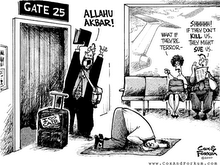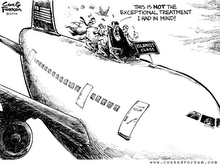From the New York Times op/ed page -- an endorsement of legislation to protect John Doe:
While the imams may or may not have suffered an injury, the harm these John Doe claims can cause will go far beyond what the defendants themselves will suffer by being dragged into litigation. It is clear this lawsuit seeks to warn Americans against voicing similar concerns. For if they do, they run the risk of opening themselves up to liability and incurring enormous legal defense costs. The effect this would have — discouraging Americans from playing an active role on the home front in fighting the war on terrorism — is chilling.
Some security experts suggest the imams’ conduct may have been intended to identify aviation security weaknesses. Their John Doe lawsuit tends to support this theory, as such a complaint can also serve to manipulate our legal system to silence those who might otherwise report suspicious activity.
Anyone in the security business knows that if a passenger exhibits suspicious behavior before takeoff, he or she cannot be allowed to board — or remain on — the plane until that behavior has been satisfactorily explained or otherwise resolved. Post-9/11, anyone entering an air terminal should be sensitive to this need and should work in a cooperative spirit to remove any suspicion.
Nothing can prevent a passenger who believes he has been wronged by the screening process from filing a lawsuit. What is outrageous is to hold good Samaritans liable simply for doing what any reasonable person observing suspicious activity should do. This is pure and simple intimidation.
In the interests of national security, Congress cannot allow this to happen. While the House has taken the initiative to insert protective language in a public transportation bill, that bill does not go far enough. Such protection needs to be comprehensive, extending to the public at large rather than just those using airplanes or other public transportation. (Obviously, such a law should not protect anyone whose motivation is based on personal profiling.)
The good Samaritan law in “Seinfeld” created a duty to act. In the real world, such a law would obviously fail judicial scrutiny. Not even in fighting the war on terrorism could a legal duty to report suspicious activities be imposed upon observers — although, one would hope, good citizens would feel a moral obligation to do so.
What can be legislated, however, is a good Samaritan federal law to protect anyone motivated to report concerns in good faith from suffering the consequences of civil liability for speaking up. We need to understand that it takes a collective effort to keep us safe, and we need to protect those who act with that in mind.









No comments:
Post a Comment